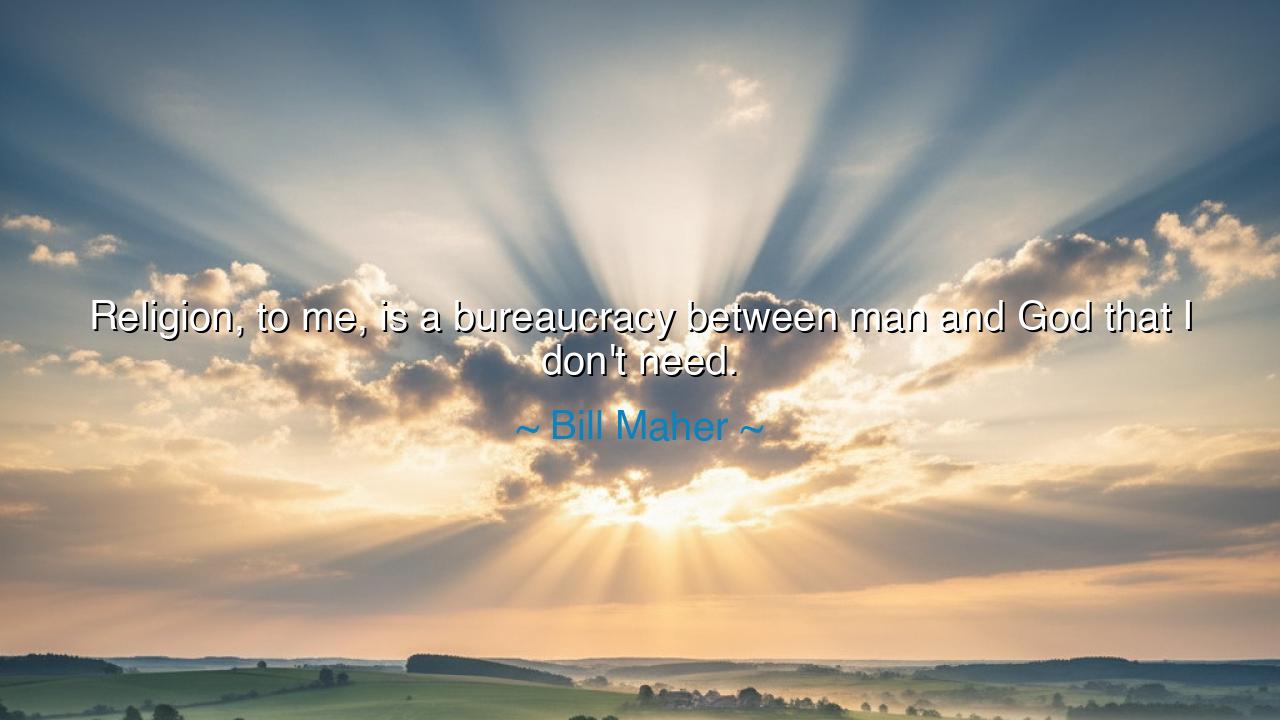
Religion, to me, is a bureaucracy between man and God that I






Hear now, O seekers of wisdom, the words of Bill Maher, a man known for his sharp critique and profound insights: "Religion, to me, is a bureaucracy between man and God that I don't need." These words cut to the heart of an ancient tension that has existed throughout history—the struggle between direct spiritual experience and the institutionalized structures that seek to mediate that experience. Maher’s statement challenges the traditions of religious practice, asking whether the bureaucracy of organized religion, with its rituals, doctrines, and intermediaries, truly serves the soul or whether it only serves to separate the individual from the divine.
In ancient times, the philosophers of Greece and the mystics of the East often rejected the need for intermediary priests or rigid religious institutions. Socrates, the great Greek philosopher, famously distanced himself from the conventional religions of Athens, claiming that wisdom could not be found in the gods of the city but only in reason and personal reflection. For Socrates, the connection between man and the divine was a personal journey, one that required no priests or rituals, only the pursuit of truth and virtue. Similarly, the Buddha rejected the rigid caste system and the religious authority of his time, teaching that enlightenment was available to all, regardless of their position in society. The spiritual path, for both Socrates and Buddha, was one of direct connection with the divine, not filtered through the lens of institutional control.
Consider the story of Jesus Christ—his ministry was one of direct interaction with the people, often challenging the religious leaders of his time. Jesus was not the priestly figure who required the formalities of the temple; instead, he preached a personal relationship with God, one built on love, compassion, and forgiveness, rather than ritualistic law. His words, "The Kingdom of God is within you," rejected the notion that man needed intermediaries or ritual to find divine connection. Jesus’ teachings were revolutionary in their simplicity—faith, he suggested, was not about the structures of religion but about living with integrity and love. In this way, Maher’s critique of religion as a bureaucracy between man and God echoes the same sentiments of freedom and directness found in Christ's message.
Yet, we must also understand that religion, in its institutional form, has often served as a guide and comfort for millions. The priests, scholars, and leaders of religious institutions have historically provided a framework for those seeking spiritual understanding, a structure that helps individuals make sense of their place in the universe. In the Middle Ages, for example, the Church provided a moral compass, a community, and a means to approach the divine that was accessible to all. St. Augustine, in his writings, spoke of the need for the Church as a guide in the pursuit of God’s truth. But even he recognized that faith was ultimately a personal matter between the individual and God, one that could not be fully mediated by an institution. This tension between institutionalized religion and personal spirituality has remained a central theme throughout history, and Maher’s words bring this age-old struggle into focus.
Maher’s critique, therefore, is not a rejection of the divine or the spiritual but a call to remove the barriers that separate the individual from a direct relationship with God. The idea of bureaucracy in religion suggests that faith has become a transactional process, something mediated by rules, rituals, and figures of authority, rather than a personal, immediate connection. To be free of this bureaucracy, as Maher suggests, is to seek a form of faith that does not rely on the external structures but is found in the heart of the individual. It is a return to the wisdom of Socrates, Buddha, and Jesus—figures who sought to teach not through institutions but through the direct experience of the divine.
So, O seekers, the lesson is this: spirituality is a personal journey, one that cannot be dictated by any external authority. While religious institutions may serve as guides, they must not replace the individual’s responsibility to seek and find their own connection with the divine. Just as Socrates searched for truth through dialogue and reason, and Buddha found enlightenment through personal meditation, so too must we cultivate a direct relationship with the divine. We must ask ourselves: are we living our faith through the rules of others, or are we truly connecting with the deeper truths within us?
In your own life, O seekers, consider how you relate to faith and religion. Do you find your connection to the divine through the rituals and doctrines of others, or do you seek a personal and direct experience of the sacred? Let your path be one of reflection, where you explore the depths of your own soul and your relationship with the divine, free from the barriers of external authority. In this way, you will find the truth that has always been within you, waiting to be uncovered. Religion may provide a framework, but it is you who must walk the path, guided by your own light and inner strength.






AAdministratorAdministrator
Welcome, honored guests. Please leave a comment, we will respond soon